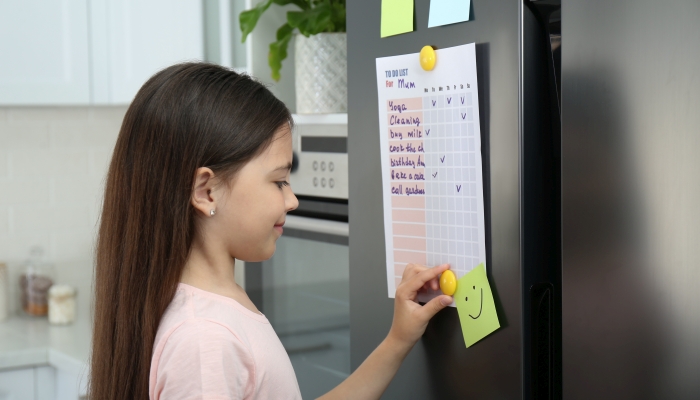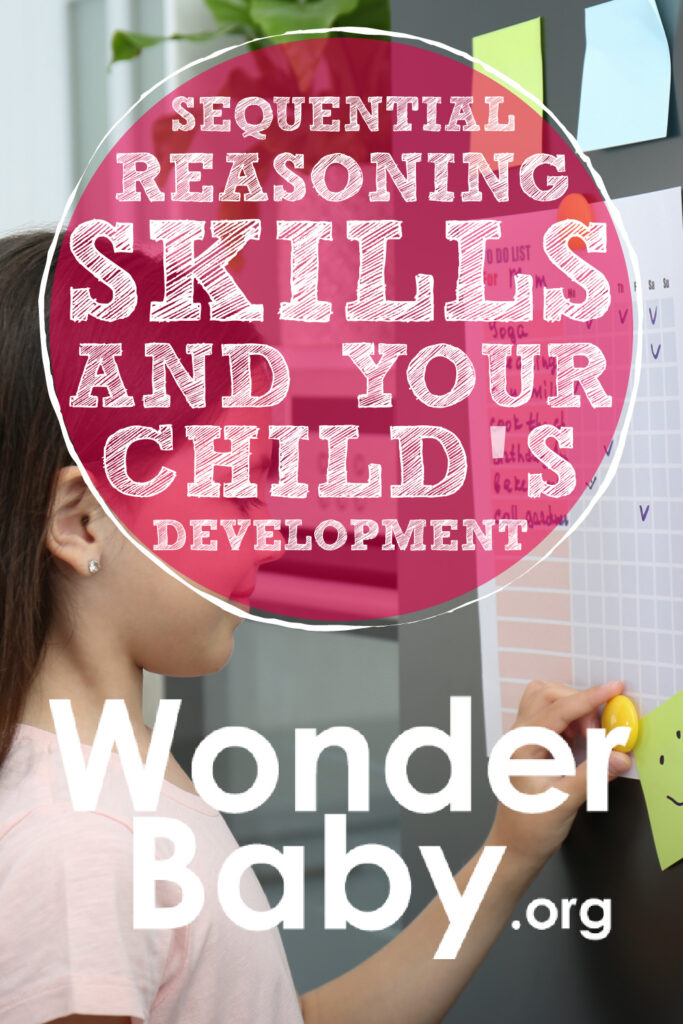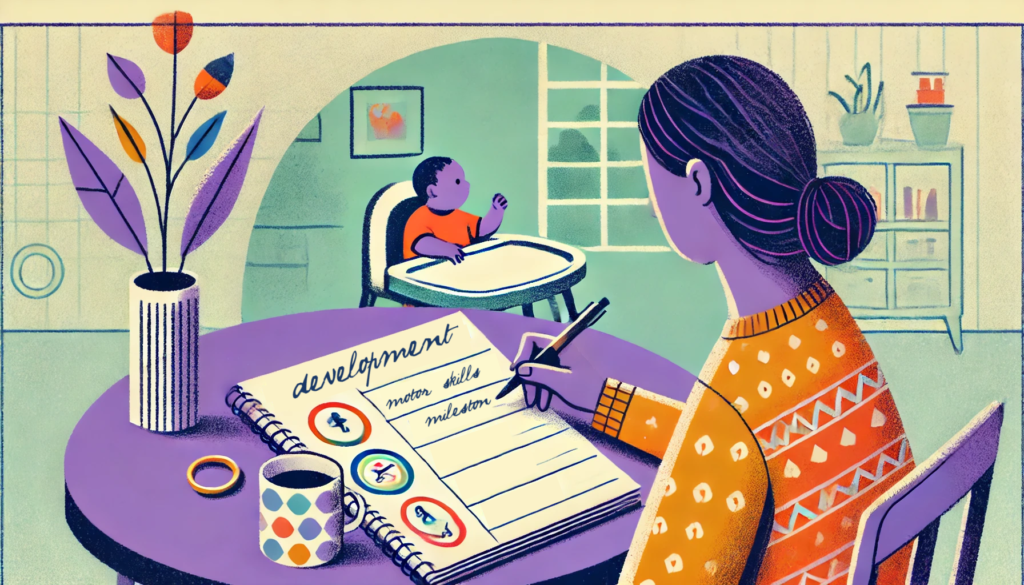Sequential Reasoning Skills and Your Child’s Development

- Sequential reasoning is the ability to solve problems in a step-by-step, logical order.
- Young children begin to understand sequencing by around 18 months.
- Sequential reasoning skills are important for school, sports, and social interactions.
- Parents can help children improve sequencing skills in multiple ways.
Does your child struggle with step-by-step instructions? Do you find yourself constantly repeating directions to your child yet he can’t seem to do them in order or remember each step?
Has someone ever told you your child seems lost or doesn’t finish tasks? Are you noticing your child fails to start tasks? Or maybe your young child is learning to talk but sentences appear out of order.
If this sounds familiar, your child might struggle with sequential reasoning. Sequential reasoning is the ability to solve problems in a step-by-step order.
Sequential reasoning is a part of cognitive development and can impact school and social interactions. Understanding the early signs of development and activities to promote sequential reasoning can strengthen your child’s sequential reasoning skills.
What is Sequential Reasoning in Children?
Sequential reasoning in children is the ability to understand a problem and break it down into specific steps, or a sequence. Learning to sequence is a part of cognitive development.
Young children, around 18 months, begin to understand instructions and that things have an order or sequence to them. As language develops children begin to understand sequencing words to create a sentence.
Sequential reasoning skills involve:
- Comprehension: the ability to understand procedures
- Metacognition: the ability to understand if on track
- Narrative coherence: the ability to tell a story
General sequential reasoning is considered one part of fluid intelligence. Fluid intelligence is one component of IQ as defined in Cattell-Horn-Carrol (CHC) theory of cognitive abilities.

What Are Signs a Child is Struggling With Sequential Reasoning?
You might notice your child struggling with comprehension, metacognition or narrative coherence in different ways. This may look like:
Struggling with step by step instructions
A child that struggles with sequential reasoning has a difficult time following steps in order. It may appear your child won’t follow directions, but in reality, they can’t. Cognitively they might struggle with understanding the big picture and how to break it down into steps.
Stories don’t make sense
When your child is first learning to talk, phrases appear out of order. Instead of “I want drink,” they might say, “Drink I want.” As language develops, storytelling appears out of order but the content is typically accurate. When writing, paragraphs are out of order or your child might struggle with organizing the story with a clear beginning, middle, and end.
Failure to start tasks
Your child’s room might be messy or appear unorganized. When asked to do a task, your child might seem lost. Starting a task can feel overwhelming because your child doesn’t know how to begin.
Struggling with multi-step instructions
When given a verbal list of instructions, such as: “Get dressed, put on your shoes, and grab your lunch,” your child might stand at the door holding their lunchbox in their pajamas. Your child can do the last part of the instructions but struggle to complete the first steps.
Not showing work in school
A child might solve a math problem but struggle to show the steps taken to get to the answer. When using a new formula, a child might struggle to mentally process and implement the steps in order.

How Important Are Sequential Reasoning Skills in Child Development?
Sequential reasoning skills impact all areas of life, including school, sports, and social situations.
Academically, sequential reasoning is used in subjects such as language arts, reading, and math. It’s also an important learning strategy in computer science.
High sequential reasoning skills allow a child to automatically organize large amounts of visual or verbal information at once.
Factors That Affect a Child’s Sequential Reasoning Skills
There are several factors that might impact a person’s ability to sequentially organize information. Common factors affecting sequential reasoning include executive function troubles, processing issues, and language issues such as:
- Attention deficit hyperactivity disorder (ADHD). A child with ADHD may struggle to pay attention or have trouble remembering steps.
- Comprehension struggles. This can be due to a cognitive developmental delay or receptive language problem. A child has difficulty understanding procedures.
- Self-monitoring skills. This is the ability to recognize if you’re on track. For example: “I’m halfway done with chores. I took out the trash and cleared the table. I just need to put my clothes away and then I’m done.”
- Working memory. The ability to remember all instructions given at one time.

How To Help a Child With Sequential Reasoning Struggles
Parents can play an important role in teaching sequencing to young children. Beginning at an early age, children naturally begin to organize information. Parents can teach sequential thinking to children.
Offer two-part instructions
As early as 18 months, begin offering two-part instructions to your child. This will introduce the concept of a logical order of events. For example, “Wash your hands and then sit at the table” or “Put your toothpaste on the brush and then brush your teeth.” Use different self-help skills to encourage your child to sequence tasks.
Do activities that involve sequencing together
Invite your kid to join you in household activities that involve sequencing such as cooking, laundry, or planting a garden. Talk about the steps you take as you complete the project. Try to use sequencing words such as: first, then, next, and finally.
Discuss books or movie plots
After reading a story or watching a movie, invite your child to retell the plot. Encourage them to talk about the details of what happened in the beginning, middle, and end.
Create visual checklists
In addition to talking through routines, create visual checklists, or object calendars, for children to follow an order in the routine. A morning routine may consist of: waking up, going to the bathroom, brushing your teeth, getting dressed, and eating breakfast.
When To Seek Help For Sequential Reasoning
If your child’s sequential reasoning skills seem low, seek the support of a psychologist or talk with your child’s school and teachers. They may have resources that can help.
A psychologist will administer tools to measure your child’s reasoning skills, such as the Sequential Reasoning Task (SRT), and can make recommendations for additional support in school.
If your child is in school, discuss the possibility of an individualized education plan (IEP) or 504 plan to offer additional support such as extra time to process the information on exams or visual checklists.

Related Posts

Development, Special Needs
How to Track Milestones for Developmentally Delayed Babies
Parents of developmentally delayed babies can explore practical tools and strategies to track milestones, celebrate progress, and support their child’s unique developmental journey.

Fine and Gross Motor
5 Alternatives to Tummy Time for Babies with Motor Development Challenges
Does your baby struggle with tummy time due to motor development challenges? These alternatives to tummy time will offer the same benefits.

Development
Should Twins Share a Room?
Wondering if your twins should share a room? We’ll explore the pros and cons of room-sharing for twins right here before you make your decision.